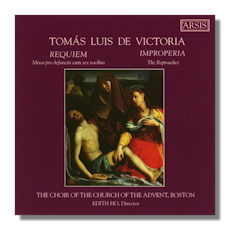
The Internet's Premier Classical Music Source
Related Links
- Victoria Reviews
- Latest Reviews
- More Reviews
-
By Composer
-
Collections
DVD & Blu-ray
Books
Concert Reviews
Articles/Interviews
Software
Audio
Search Amazon
Recommended Links
Site News
 CD Review
CD Review
Tomás Luis de Victoria

- Missa pro defunctis cum sex vocibus
- Improperia
Church of the Advent Choir/Edith Ho
Arsis CD149
Tomás Luis de Victoria's (1548-1611) Requiem is an uncommonly beautiful work. It's tempting to think that its relaxed and expansive atmosphere reflect the good fortune and unusually favorable circumstances under which Victoria composed… he held positions for long periods of time with choirs "attached" to stable and prestigious foundations; he was well-off enough financially to be able to ensure that whichever of his own works he wanted were published; and he traveled widely and took in the best of other European composers – particularly in Rome.
This splendid, highly idiomatic, recording by the Church of the Advent Choir from Boston, Massachusetts is as precise and focused as the work demands. The singers' enunciation and articulation of the Missa pro defunctis are as transparent and conducive to our understanding the text as they are flowing and broad. The only concession to what might seem an almost romantic gloss on the Requiem is a relatively slow choice of tempi.
Expressiveness certainly is something to which the Choir and their conductor, Edith Ho, have aspired to – and have achieved. One is left with a feeling of great serenity and hope, rather than sorrow, at the end of the performance. Written in 1603 for the ceremonies following the death of the Empress Maria, to whom Victoria was personal chaplain, the Requiem for six voices interpolates polyphony with Gregorian Chant. This recording observes that practice, the second soprano taking the chant, which serves as a cantus firmus. This makes the work 11 movements long: as you listen you really do begin to wonder how the next can be as gorgeous in melody and texture as the previous. But it is. The Requiem is also Victoria's last work and in some ways represents the climax of the Spanish Renaissance tradition and achievement. Without sentimentality, Ho and her forces reflect this by letting the majesty and sublimity of the lines unfold almost as if Victoria himself could also now rest.
A further 25 minutes or so of this CD are taken by two versions of the Improperia. This is the setting for Good Friday of the liturgical chants known as the "Reproaches". Originally sung as chant, polyphonic elaborations first appeared in the Renaissance. They are performed at one of the most solemn point in the liturgy – the veneration of the cross – and reflect on the ingratitude of humanity to God's generosity in forgiving it, despite its sins. Victoria's setting is different from those of other composers of the time in that he alternates chant and his composed polyphony. Even then, the polyphony is homophonic and syllabic. This lends a spare and almost gaunt feel to the work. The Choir, which is very familiar with the Improperia, having performed it (annually) for decades, sings the work in Latin, Greek and English. It's a striking experience: the performers are particularly adept on this CD at conveying the essence of the work by advancing the text: it gently yet firmly leads us through the music.
In addition to the lovely music which these two extensive works represent, the Choir of the Church of the Advent also offers contrast: between the melismatic and stark styles, in each of which Victoria excelled. Recorded in the sympathetic acoustic of their church in Boston and with a short but informative booklet containing texts in the original and translation, this is a CD to be treasured.
Copyright © 2009, Mark Sealey




















